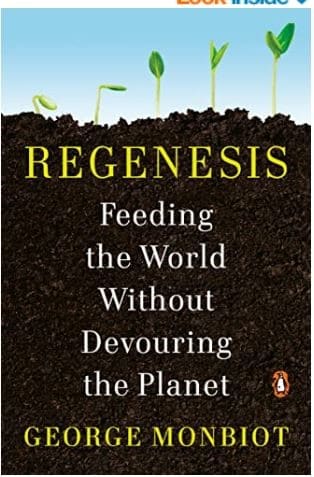By Jim Heffernan
I always love it when a book presents me with a very original and a radically new way of looking at things. This book is that sort of book.
“Regenesis” starts out with the author’s idyllic description of his apple orchard and the joy he gets from tending it. He soon switches to zoologist mode and describes what a marvelous ecosystem mature soil is. On page 25 he states, “Soil might be the most complex of all living systems. Yet we treat it like dirt.”
The book is largely devoted to contrasting regenerative, organic agriculture with conventional industrial agriculture as is practiced in Britain, the United States, and much of the world.
Monbiot spends considerable time with a superb organic farmer named Iain Tolbert aka “Tolly”. Tolly intensively farms 18 acres of chalky soil as the basis of a thriving business that employs about a dozen people and markets vegetables and produce to neighboring villages. He farms intensively in the sense of devoting a lot of thought and labor into his methods. The only amendment he uses for maintaining the fertility of his soil is occasionally adding wood chips. The wood chips act as an inoculant, adding carbon and maintaining a healthy microbial balance in the soil. Otherwise, he maintains and improves the health of his soil by a carefully plotted scheme of crop rotation.
Monbiot concludes that Tolly’s amazing methods are, unfortunately, not an answer to feeding the world. At present, the world needs the protein supplied by the giant crops of wheat, corn, soybeans and rice that we get by devoting millions of acres of prime arable lands to their production.
The trouble is our population continues to grow and our high intensity methods of agriculture, which require ever larger inputs to maintain the yields and profitability were accustomed to, are setting us up for a fall. Basically, we are destroying our marvelous biosphere of arable soil and trying to compensate with more and more chemicals.
Earthworms per cubic foot is a good measure of the health of soil. Typical good garden soil contains about 150 earthworms per cubic foot. Tolly’s soil contains 800 earthworms per cubic foot. “Industrial agriculture” soil sometime contains as few as 20 earthworms per cubic foot.
Monbiot describes our modern agriculture as a very complex interconnected system that is becoming more and more sensitive to disruption and collapse. It’s sort of a chicken and egg question, is our changing climate affecting our agriculture? Or is our agriculture damaging, maybe irretrievably, our climate and our environment?
He offers a solution that came as total shock to me. He says the solution is using precision fermentation and carefully bred microbes to produce protein as a replacement for what we now get from the “big four” cereals and legumes.
He describes an operation in Finland that uses a bacterium separated from the soil. This microbe digests hydrogen separated from water. It reproduces at a phenomenal rate, as microbes are apt to do, and the carcasses can be processed into a high protein powder that has the potential to replace the protein we now get from grains, legumes, and livestock.
Precision fermentation has the advantage of requiring a very small footprint and can be done almost anywhere. A relatively small array of tanks and pumps, a modest source of water, and an energy source are all that’s required. The process goes on all year long and is not dependent on the weather.
Monbiot describes eating a pancake made from microbes and reports it tasted just fine.
The land presently squandered for food and livestock production could be re-wilded. Our soil could recover and become a healthy biosphere. It would be a marvelous carbon sink that could reverse our climate change and repair the damage we’ve done to the planet.
I hope he’s right. Extinction events are no fun.
340 pages (108 notes, index, etc.) Published August 9, 2022
Available Cloud and Leaf Bookstore, Manzanita, Tillamook Public Library
Goodreads 4.43 of 5 Average, 1030 ratings
In 2022, Monbiot was awarded The Orwell Prize for Journalism.
George Monbiot was born in England in 1963 and earned a degree in Zoology at Oxford. He then became an investigative journalist and writer. He seems to have a flair for causing commotion. He has been declared persona non grata in seven countries and sentenced to life in prison in Indonesia (in absentia). He writes a regular column about political and environmental topics for The Guardian newspaper in Britain. He has written 14 books.


